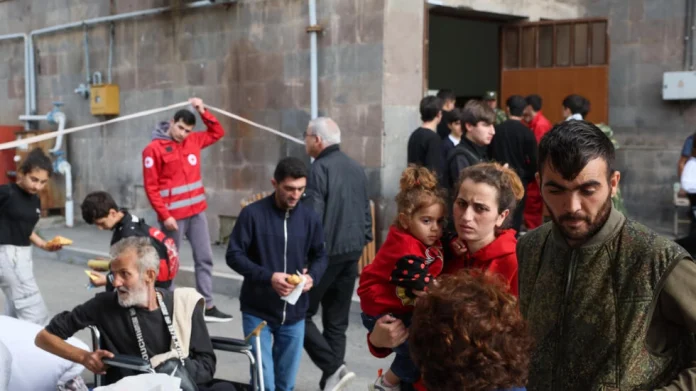Tens of thousands of now homeless ethnic Armenians have flooded into Armenia from Azerbaijan-controlled Nagorno-Karabakh, LA Times informs.
Crowds have been protesting in the streets of the Armenian capital Yerevan, demanding the resignation of the prime minister.
The country faces a host of problems after being embroiled in one of the worst political crises in its decades of independence since the collapse of the Soviet Union in 1991.
Azerbaijan conducted a rapid military operation in Nagorno-Karabakh, a predominantly Armenian-populated and internationally recognised part of Azerbaijan.
The Azerbaijani blockade led to food shortages. The government of the region was forced to capitulate in 24 hours, and political leaders announced the dissolution of the government by the end of the year.
This led to a mass exodus of ethnic Armenians who were afraid to live under Azerbaijani rule. More than 80 per cent of the 120,000 inhabitants of the region hastily packed their belongings and left for Armenia along the only mountain road.
Laurence Broers, an expert on the region at Chatham House:
There’s a tremendous amount of anger and frustration directed at Nikol Pashinyan.
The Pashinyan government is supposed to provide the newcomers with housing, medical care and jobs. However, the prime minister accuses Russian peacekeepers of failing to prevent recent military action by Azerbaijan.
Azerbaijan regained parts of Nagorno-Karabakh in a six-week war in 2020, and Russia sent some 2,000 peacekeepers to the region as part of a Kremlin-brokered ceasefire.
Thomas de Waal, a senior fellow at the Carnegie Europe think tank, also considers the unwillingness of peacekeepers to actively intervene in the conflict the reason for Azerbaijan’s victory.
“Clearly, this Azerbaijani military operation would not have been possible if the Russian peacekeepers had tried to keep the peace, but they just basically stood down.”
The Kremlin, in turn, blames Pashinyan for the incident. Russian President Vladimir Putin expresses his distrust of the former journalist, who came to power in 2018 after leading the protests that replaced the previous government.
The Russian Foreign Ministry criticised “the inconsistent position of the Armenian leadership, which changed its policy and sought Western support in close cooperation with Russia and Azerbaijan.” Moscow denies involvement in fuelling protests against Pashinyan.
The Armenian leadership is making a huge mistake by deliberately attempting to sever Armenia’s multifaceted and centuries-old ties with Russia, making the country a hostage to Western geopolitical games.
Despite worsening relations with the Kremlin, Pashinyan refrained from stating he would cut ties with Moscow, but emphasised the need to strengthen security and other ties with the West.
Russia is Armenia’s main trading partner and is home to an estimated 1 million Armenians, who might strongly resist any attempt by Pashinyan to sever ties with Moscow.
“Economically speaking, strategically speaking, Russia is still very deeply embedded in the Armenian economy in terms of energy supply and ownership over key strategic assets. It’s going to need a lot of creativity from other partners for Armenia to broaden out its foreign policy.”
Thomas de Waal:
Do they just sort of try and force Armenia at the negotiating table or do they actually start to use force to try and get what they want? This is the scenario everyone fears.
